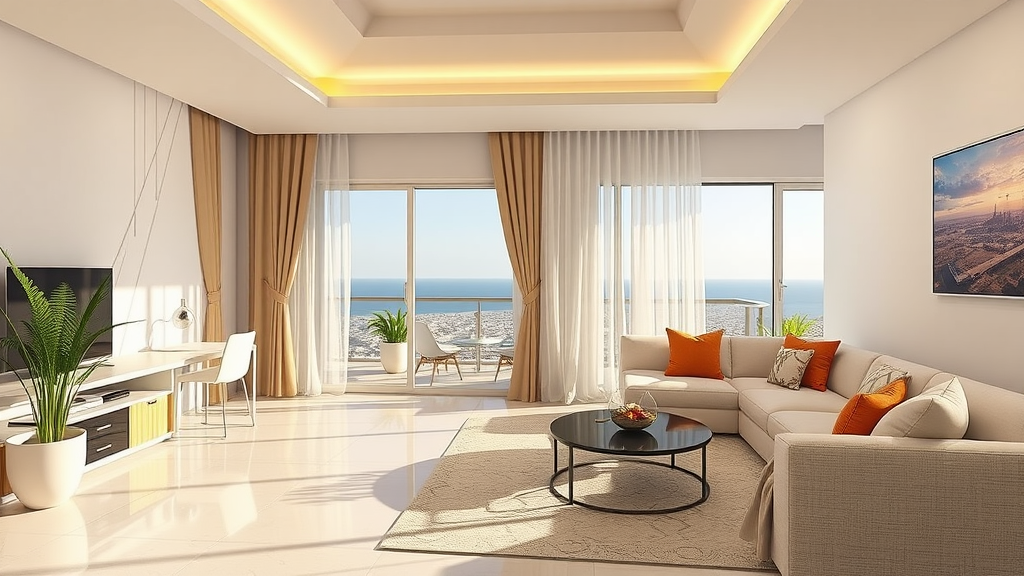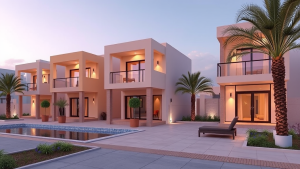Comparing denmark’s buyers: analyzing Hurghada’s installment plans versus spain’s mortgage options
Denmark’s real estate buyers are continuously exploring favorable options for property investment. An emerging trend is the comparison between installment plans in Hurghada, Egypt, and mortgage options available in Spain. Understanding these financial alternatives can help Danish buyers make informed decisions when purchasing property abroad.
Understanding Hurghada’s installment plans
Hurghada, a robust tourist destination on the Red Sea, offers numerous installment plans designed to attract foreign buyers. The primary draw of these plans lies in their flexibility and accessibility. Many developers provide:
- Low initial deposits: Buyers often need to pay just 10-20% upfront.
- Extended payment periods: Installments can stretch over several years, enabling buyers to manage their finances better.
- Interest-free options: Certain real estate developers provide interest-free plans, allowing greater savings.
The appeal of Hurghada’s installment plans lies in their straightforward process, which allows buyers to invest without a substantial upfront cash outlay. Additionally, these plans often cater to a diverse range of budgets, making it easier for buyers to find properties matching their financial capabilities.
Spain’s mortgage options: a comprehensive overview
On the other end of Europe, Spain remains a highly attractive option for property buyers, including those from Denmark. Spanish mortgage options feature a variety of plans that provide different benefits. Key highlights include:
- Competitive interest rates: Spain offers mortgage rates that can be lower than those in other European countries, making it appealing for long-term investments.
- Fixed or variable rates: Buyers can opt for fixed rates for stability or variable rates for potentially lower short-term payments.
- Access to local banks: Many Spanish banks understand the needs of expatriates and provide tailored solutions for foreign buyers.
Additionally, Spain offers mortgage terms that can last up to 30 years, making it easier for buyers to manage their budgets while acquiring desirable properties. However, the complexity of the mortgage application process may deter some buyers, as it often requires thorough documentation and a good credit rating.
Comparing flexibility and accessibility
When examining Denmark’s buyers’ preferences between Hurghada’s installment plans and Spain’s mortgage options, the key difference is the level of flexibility. Installment plans in Hurghada appeal to buyers seeking straightforward solutions without the complexities of traditional financing. The relatively affordable initial costs allow for greater accessibility.
Conversely, Spain’s mortgage options cater to those looking for a longer commitment to property ownership. While the application process may be rigorous, once approved, it provides a robust structure for managing large investments over time.
Investment potential and market trends
The decision between Hurghada and Spain also hinges on potential returns and market performance. Hurghada’s property market is noted for rapid growth in response to tourism, presenting short-term investment opportunities. Prices can rise quickly, leading to profits for savvy investors.
In contrast, the Spanish property market offers stability backed by years of historical data. Investors can generally anticipate steady appreciation, especially in popular locations like Barcelona and Madrid. This long-term viability can be comforting for buyers focused on future resale value.
Understanding the cultural and legal landscape
Another crucial factor is the cultural and legal environment surrounding property purchases in both locations. Egyptian laws can sometimes be challenging to navigate for foreign buyers, and understanding these complexities is essential before committing to an installment plan in Hurghada.
In Spain, while legal regulations are generally transparent, it remains important to seek advice from local real estate experts or legal advisors to comprehend any nuances in the buying process, especially regarding mortgages.
Denmark’s buyers are encouraged to weigh these factors when comparing Hurghada’s installment plans with Spain’s mortgage options. The choice ultimately hinges on individual preferences, financial situations, and investment goals. By understanding these differences, you can make informed decisions that align with your property aspirations abroad.
Financial considerations for foreign buyers in Hurghada and spain: a comprehensive overview
When considering a property purchase abroad, understanding the financial landscape is crucial. For many foreign buyers eyeing Hurghada in Egypt, or Spain, it’s essential to compare the financial options available and how they cater to differing needs.
Understanding installment plans in Hurghada
Hurghada, a popular tourist destination on the Red Sea, attracts numerous foreign investors. One key financial option for buyers is the installment plan. Real estate developers in Hurghada often facilitate flexible payment structures. Here are some typical features:
- Low Down Payments: Many developers require as little as 10-20% deposit, making it accessible for buyers.
- Extended Payment Terms: Buyers can often pay the remaining balance over several years, sometimes up to 5-10 years.
- Interest Rates: These installment plans typically come with low or no-interest financing, reducing overall costs.
- Construction-Linked Payments: Payments can be linked to construction milestones, providing peace of mind for buyers as they see their property develop.
These features cater to foreign buyers who may not want to commit to a substantial mortgage upfront. Subsequently, this flexibility can ease the overall financial burden and makes property investment in Hurghada an attractive option.
Exploring mortgage options in spain
In contrast, Spain offers a more traditional route for buyers through mortgage options that come with their own set of benefits and challenges. Understanding the Spanish mortgage landscape is vital for anyone interested in investing here.
- Types of Mortgages: Spanish banks offer various mortgage types, including fixed-rate, variable-rate, and mix-rate options, offering flexibility based on your financial situation.
- Down Payments: A typical down payment in Spain ranges from 20-30% of the property price. Some banks may lend up to 80%, but this often varies based on the buyer’s profile.
- Loan Terms: Most mortgages have terms ranging between 15 to 30 years, providing a long duration for repayment.
- Eligibility: Foreigners can also secure a mortgage in Spain; however, local banks may require certain documentation such as proof of income, tax returns, and a valid passport.
The mortgage process in Spain is generally well-defined but may involve higher upfront costs compared to installment plans in Hurghada. Understanding the implications of additional fees, including notary and registration costs, is particularly important when budgeting for a property purchase.
Comparative financial considerations
When you compare the financial considerations between Hurghada and Spain, several factors arise:
- Affordability: Hurghada’s low entry costs and flexible payment terms generally offer affordability for buyers compared to Spain’s higher down payment requirements.
- Financial Commitment: The installment plans in Hurghada allow for a reduced immediate financial commitment, which is ideal for buyers who may prefer to allocate resources elsewhere.
- Security in Ownership: Mortgages in Spain often provide a clear pathway to ownership, creating a sense of security when investing in property, while installment plans can sometimes entail further risk if not structured properly.
- Future Market Growth: Both markets have strong appeal, but Spain has a more established real estate market, which may reassure buyers looking for long-term investments.
The choice between Hurghada’s installment plans and Spain’s mortgage options ultimately depends on your personal financial situation, investment goals, and how comfortable you are with long-term commitments.
The role of currency fluctuation
Another financial aspect to consider is currency fluctuations. For many foreign buyers, the currency exchange rate between your home currency and Egyptian pounds or Euros can significantly impact your overall investment. A strong Euro against the Egyptian pound may make properties in Hurghada more affordable and appealing. Conversely, buyers looking at Spain need to consider the Euro’s stability or volatility, especially if your home currency is weaker.
Investing in foreign real estate is an exciting venture, but it demands careful financial consideration. Whether opting for Hurghada’s favorable installment plans or Spain’s robust mortgage options, clear evaluation will facilitate a sound investment decision.
As Denmark’s buyers explore the housing markets in Hurghada and Spain, the differences between installment plans and mortgage options are clear and worth considering. Each approach has distinct advantages tailored to various financial situations and preferences. Hurghada’s installment plans provide an appealing option for those looking for flexibility and accessibility, potentially reducing the financial strain often associated with larger upfront payments. This model allows buyers to manage their budget more effectively, particularly in a vibrant market with attractive property prices.
On the other hand, Spain’s mortgage options offer extensive choices with longer terms, competitive interest rates, and well-established legal frameworks that can instill confidence in foreign buyers. Understanding the nuances of each system is essential for Danish investors deciding where to allocate their resources. Each option’s pros and cons should be weighed carefully based on individual financial circumstances and investment goals.
Ultimately, the choice between Hurghada’s installment plans and Spain’s mortgage options will greatly depend on your lifestyle and investment strategy. Both locations present exciting opportunities for Danish buyers, whether seeking a holiday home or a long-term investment. Evaluating personal priorities, such as immediate affordability versus long-term financial commitments, will guide this significant decision. As you navigate this journey, staying informed and considering expert advice can lead to a rewarding investment experience in either destination.











